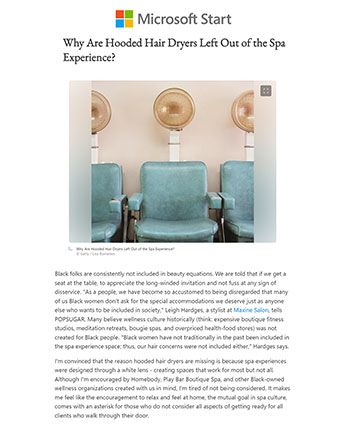MSN February 29, 2024
 MSN
MSN
Health
Why Are Hooded Hair Dryers Left Out of the Spa Experience?
It's no secret that caring for naturally curly hair takes effort. With a head full of multiple curl patterns and strand porosities, I find myself altering my 4A coily wash-day routine every couple of months. Exhausting? Sure. But I love my curls and I wouldn't change them. However, finding easier ways to maintain bouncy, moisturized, and defined curls is always a top priority — which is why I've been using a hooded hair dryer for the last year.
There are two options for hooded dryers: soft or hard, each available for salon and at-home use. Soft hooded dryers appear more like a bonnet with an attached cord. You simply put it on over your head, plug it in, and let the heat work through the hair. On the other hand, hard hooded dryers resemble more of the professional pieces you see at a salon. With options from Conair, Kiss, and more, these can sit on top of your vanity or table while you enjoy hands-free drying.
Because of the controlled heat, these dome-shaped dryers are the key to securing long-lasting curl definition (with a regular blow dryer, curls move from side to side as you blast them with hot air, disrupting the definition). Hooded dryers open up the hair cuticle and help the hair absorb nutrients from conditioners and styling products, reducing the risk of frizz and leading to more hydrated curls.
For myself and many other Black women, using a hooded dryer is as routine as brushing your teeth. A quick 30 minutes under the dryer leaves my curls bouncy for four to six days. And yet, on a recent visit to a day spa, one of these foundational tools — or really, any products for styling naturally curly hair — was nowhere to be found.
I was recently invited to a members-only resort in California for a next-level spa treatment. Although the 80-minute massage was easily the most relaxing time spent in 2024 so far, my bliss evaporated when I realized there was nothing for my 4A curls available in the post-treatment facilities.
Following my massage, I was told to "make myself at home" in the locker room. Eager to freshen up, I looked around at the tools available to me: there was a basket of Drybar hair dryers, generic hair sprays and deodorants, and an Amika heat spray. Notably missing was a hooded dryer or even a diffuser attachment for the hair dryers.
Was this spa in the dark about the things I — and so many other Black women — would need to feel pampered? Or worse, had they considered it and decided not to act on it? It got me thinking: yes, wellness spaces are increasingly stocking locker rooms with curl products, but they still fail to include tools that would service the natural hair community, like hooded hair dryers and diffusers.
Black folks are consistently not included in beauty equations. We are told that if we get a seat at the table, to appreciate the long-winded invitation and not fuss at any sign of disservice. "As a people, we have become so accustomed to being disregarded that many of us Black women don't ask for the special accommodations we deserve just as anyone else who wants to be included in society," Leigh Hardges, a stylist at Maxine Salon, tells POPSUGAR. Many believe wellness culture historically (think: expensive boutique fitness studios, meditation retreats, bougie spas, and overpriced health-food stores) was not created for Black people. "Black women have not traditionally in the past been included in the spa experience space; thus, our hair concerns were not included either," Hardges says.
I'm convinced that the reason hooded hair dryers are missing is because spa experiences were designed through a white lens — creating spaces that work for most but not all. Although I'm encouraged by Homebody, Play Bar Boutique Spa, and other Black-owned wellness organizations created with us in mind, I'm tired of not being considered. It makes me feel like the encouragement to relax and feel at home, the mutual goal in spa culture, comes with an asterisk for those who do not consider all aspects of getting ready for all clients who walk through their door.
Today, we speak so much about the lack of diversity in hair aisles and salons and on runways without realizing that the day spa experience should too be added to the long list of segregated institutes in beauty (hair salons, in-room hotel product offerings, etc.). For the audiences who aren't privy to the hooded dryer experience, incorporating this into spa pampering would be a teaching moment — one that normalizes the traditions of getting-ready routines in Black culture. It would not only make myself and other Black women who use the drying system feel included and seen but also create an opportunity for outside communities to understand our journey — ultimately, celebrating our culture.
Natasha Marsh is a freelance writer who writes about fashion, beauty, and lifestyle. Prior to freelancing, she held styling staff positions at The Wall Street Journal, Burberry, Cosmopolitan, British GQ, and Harper's Bazaar.
